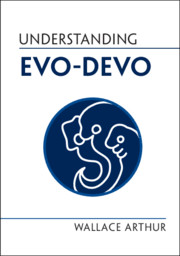Book contents
- Understanding Evo-Devo
- Series page
- Understanding Evo-Devo
- Copyright page
- Reviews
- Dedication
- Contents
- Foreword
- Preface
- Acknowledgements
- 1 What is Evo-Devo and Why is it Important?
- 2 Antecedents of Evo-Devo
- 3 Evolutionary and Developmental Essentials
- 4 Evo-Devo Essentials
- 5 The Evolution of Variations on a Theme
- 6 The Evolutionary Origins of Themes and Novelties
- 7 The Evolutionary Origins of Body Plans
- 8 Body-Plan Features and Toolkit Genes
- 9 Bringing It All Together
- Concluding Remarks
- Summary of Common Misunderstandings
- References
- Figure Credits
- Index
3 - Evolutionary and Developmental Essentials
Published online by Cambridge University Press: 29 April 2021
- Understanding Evo-Devo
- Series page
- Understanding Evo-Devo
- Copyright page
- Reviews
- Dedication
- Contents
- Foreword
- Preface
- Acknowledgements
- 1 What is Evo-Devo and Why is it Important?
- 2 Antecedents of Evo-Devo
- 3 Evolutionary and Developmental Essentials
- 4 Evo-Devo Essentials
- 5 The Evolution of Variations on a Theme
- 6 The Evolutionary Origins of Themes and Novelties
- 7 The Evolutionary Origins of Body Plans
- 8 Body-Plan Features and Toolkit Genes
- 9 Bringing It All Together
- Concluding Remarks
- Summary of Common Misunderstandings
- References
- Figure Credits
- Index
Summary
Our starting point for discussion of evolutionary pattern is the word ‘clade’. This was introduced by the British biologist Julian Huxley (grandson of Darwin’s bulldog T. H. Huxley) in the 1940s. It means a taxonomic group of a particular kind: one that includes all the descendants of a particular ancestral species, and no others. This kind of group can also be called monophyletic. When the German taxonomist Willi Hennig founded the new approach to taxonomy that we now call cladistics, in the 1950s and 1960s, the idea of a clade was central. For those not familiar with cladistics, Hennig’s main concern was that the evolutionary trees that were used through much of the literature of evolutionary biology confounded two things: closeness of ancestry and similarity in body form.
Keywords
- Type
- Chapter
- Information
- Understanding Evo-Devo , pp. 37 - 57Publisher: Cambridge University PressPrint publication year: 2021

